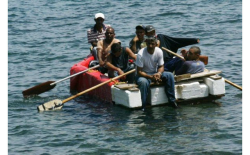Cubans Hope for Migration Reform

Whether or not they live in Cuba, whatever their political affiliation, most people consulted by IPS want changes to Cuban migration policy that include three key elements: freedom, rights and normalisation.
Described by President Raúl Castro as an 'updating' of migration policy in line with the ongoing economic changes, migration reform is one of the most anxiously awaited by a large part of the population, given its impact on people’s lives and their relationships with family members abroad.
'The first thing would be to treat the issue of migration as a basic human right,' poet Alex Fleites said in response to a question by Café 108, an IPS Cuba initiative to foster citizen participation in investigative journalism.
Most people consulted by IPS listed, as essential elements for ensuring the human right of freedom of movement, the elimination of the exit permit required for any trip outside of Cuba and the elimination of the category known as 'salida definitiva' or 'final departure.' They also said Cuba should recognise the right to return.
Marked by the Cuba-U.S. conflict, emigration by Cubans was viewed for decades as a political phenomenon. Émigrés were considered to have left the country forever, without the possibility of returning to live or to visit.
The situation began to change with the authorisation of visits by members of the Cuban community abroad, following the 1978 talks between former President Fidel Castro and a group of émigrés. A greater opening occurred in the 1990s with the authorisation of temporary residence in other countries.
However, rules that were considered a step forward at the time are now viewed as unnecessary, and have triggered a whole series of regulations and actions that continue to place the Cuban people in a situation that is unique in Latin America.
'Cuba needs to respect its citizens and to recognise their right to enter and leave the country without obstacles or fees. The fatherland is home, and one returns home when one pleases, without obstructions of any kind,' playwright Esther Suárez Durán said on Café 108.
One aspect that is generally omitted was mentioned by Raúl Regueiro. 'Recently, I had the misfortune of having my exit permit delayed for a second time because I have HIV,' Regueiro said, describing the process as 'discriminatory, humiliating and degrading.'
One of the most frequent comments was the need to eliminate the letter of invitation, which is required not only by foreign embassies for visa applications, but also by Cuban immigration authorities for permission to leave the country.
Participants in the Café 108 discussion also said that other requirements that should be eliminated are the costly procedures involved in authorisation to live abroad, such as the renewal of permits, and the loss of rights or property for people who are placed in the 'final departure' category.
In addition, 'fees for passports and other official paperwork should be in Cuban pesos on a sliding scale based on people’s wages,' rather than charging high prices in hard currency, which has been the case since the legalisation of the dollar in 1993, according to a proposal from feminist Yasmín Silvia Portales, creator of the blog 'En 2310 y 8225'.
The issue of children is also controversial. After 14,048 unaccompanied minors went to the United States between 1960 and 1962 as part of the so-called Operation Peter Pan, protective regulations have been in place for children, but over time, they have caused unnecessary family divisions.
Likewise, several participants in the IPS consultation advocated the right of parents to travel outside the country, for whatever the reason, accompanied by their children who are minors.
For her part, Sandra Álvarez, author of the blog 'Negra cubana tenía que ser', said that 'the children of Cuban émigrés should not be considered foreigners.'
Also controversial are the regulations in place to curb the exodus of professionals. Any policy on that question 'should be based on motivational mechanisms that respect the rights of individuals and that, above all, are not discriminatory,' said Josué Portal, a participant in the Café 108 debate.
On that same issue, economist and political scientist Esteban Morales noted that Cuba is 'a poor country with many internal difficulties in guaranteeing people’s life aspirations,' which is why 'solutions to that problem should be more flexible and intelligent.'
'Believing that the human capital that we have created is protected by preventing or restricting people from travelling abroad is truly dysfunctional. All Cubans should be able to live and work wherever they want, and they should be able to return to their country whenever they want,' he said.
Another issue closely related to migration is the contradictory question of 'nationality,' said historian and ethnologist Jesús Guanche. According to the current laws, people born on the island are always Cuban; they never lose their nationality, and no second or third nationality is recognised.
The right to several nationalities 'does not eliminate patriotism or a sense of belonging, which is a cultural tradition, a conviction, and not a piece of paper,' Guanche said. He commented that the idea of the 'urgent integration' of Latin America and the Caribbean means that 'we must also think about a ‘grand national’ legal status.'
© Inter Press Service (2011) — All Rights Reserved. Original source: Inter Press Service
 Global Issues
Global Issues